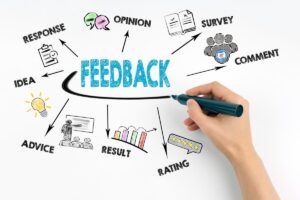As a consultant, you rely on valuable feedback from your clients to drive change in their organization. Your clients also rely on the feedback they get from their leaders, employees, customers, and the community. The feedback that is received helps them improve their company. But for optimum improvement, you both rely on honest feedback that has value.
 Valuable feedback is essential for driving change. A problem is that much of the feedback might be based on opinions with biases. Plus, when you are communicating with multiple leaders in an organization, you are bound to get different feedback that is conflicting.
Valuable feedback is essential for driving change. A problem is that much of the feedback might be based on opinions with biases. Plus, when you are communicating with multiple leaders in an organization, you are bound to get different feedback that is conflicting.
How do you know which feedback is valuable to effectively improve performance?
Valuable feedback gives you clarity and is purposeful, meaningful, and compatible with what you know and are trying to achieve. For your client to improve their company’s performance, it is important to recognize valuable feedback.
5 Qualities of Valuable Feedback
Task specific
Valuable feedback has a clear business focus with a larger overall goal for the company instead of being generic. It should be concise and provide data to support the feedback and examples, such as talent issues, project details, and goals met. Incomplete or vague information can cause misunderstandings and delays. Clarifying that you and your client have all the specifics necessary to take the next step is essential when receiving feedback.
Timely
It can be discouraging to manage feedback that you wish you had gotten sooner. We have all heard stories about someone failing to inform them about a problem that needed to be addressed immediately. Valuable feedback communicates complete information about something in a timely manner so you can act on it efficiently. For this to happen, feedback should be part of a routine. You must have regular check-ins with your client, and they must have routine check-ins with their team to ensure no one is left waiting around.
Meaningful
Constructive feedback that is given in a conversational manner, which is useful and provides aspects that you and your client can control, is the most valuable. Ideally, you are looking for a balance of negative and positive attributes that are realistic for identifying and solving a problem. Listen for feedback that offers praise for hard work, focus, determination, imagination, and fairness, but is not sugarcoated. At the same time, you do not want all criticism either. Your client should recognize that there is room for improvement.
Well Delivered and Received
Effective criticism needs to be delivered and received with respect and care. It is only effective when the person receiving it is receptive to it. If there is avoidance or blame, problems will be less likely to be addressed and solved. In addition, a good indicator of valuable feedback is in how it is given. Opinions are good, but fear and bias influence behavior that can manipulate or limit information. This can significantly affect how change that is meant to improve performance will be accepted. When you are working with a client and their team, listen to the language and watch for signs that might indicate if they are disconnecting from the feedback or have other negative reactions to it.
Goal-oriented
Valuable feedback must be actionable. In other words, it must be tied to what it is your client is trying to achieve with their company’s goals and consistent with the purpose, vision, and mission of the company. Without the connection, it will be challenging to get the results you and your client are striving for. Listen to examples of how the company can improve in areas such as completing multiple tasks, managing complexities, going the extra mile, and adhering to company policies. You want to be encouraging instead of discouraging, so be clear about your intentions and goals when requesting feedback.
Creating an Actionable Plan Using Feedback
When done well, valuable feedback gives hope for change because it helps give solutions and is actionable. To improve performance, help your client use the feedback to develop a simple, actionable plan that identifies the following:
- Performance issues for improvement
- Clearly identified expectations
- Actionable goals that are realistic to achieve
- Tasks that can be connected to the overall growth of the company
- A timeline to achieve goals
Remember that feedback is the lifeblood of improving performance. Valuable feedback helps to keep everyone on task so they can perform their best.
The Profit Enhancer Analysis is our proprietary predictive model software that helps consultants gather feedback from your clients to improve their company’s performance with strategy and transparency. Each time you gather feedback, you can compare it to prior feedback to get a good understanding of how performance is improving or not progressing. By tracking performance, the software helps you to see the consistency of valuable feedback that can be used for achieving short-term and long-term performance goals for your client.
